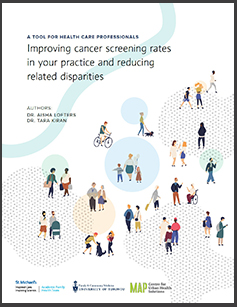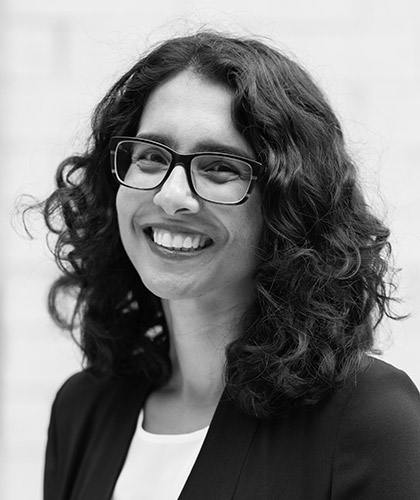
We created this practical toolkit to help primary care providers to improve cancer screening rates in their practices and reduce related disparities, based on our own research and findings from the literature.
Screening for breast, cervical, and colorectal cancer has been shown to reduce sickness and death, yet many Canadians do not get screened.
In 2014, the St. Michael’s Hospital Academic Family Health Team began a quality improvement initiative to investigate barriers to screening, and to develop and test solutions to improve screening rates. This work was led by Drs. Tara Kiran and Aisha Lofters, who are MAP scientists and family doctors with the St. Michael’s Hospital Academic Family Health Team. The results are very relevant to Family Health Teams across Ontario – many are interested in finding ways to improve screening rates.
What we’ve learned
We began by trying to implement evidence-based strategies to improve our cancer screening rates. Our team improved the reminders in patients’ charts, provided doctors with data about who in their practice was not screened, and proactively reached out to patients who were overdue. We also compared the effectiveness of letter versus phone call outreach and found that phone calls were more effective but also more expensive. Overall, screening rates improved. But, when we took a closer look at the data, we saw some people were left behind.
People who were trans were often misclassified in outreach efforts – sometimes inappropriately contacted and sometimes not contacted when they should have been. Screening rates for the trans population were lower than for the cis population – but we also found that in many cases, not being screened was an informed choice made by someone who was trans because the procedure was gender dysphoric.
Our team also found that patients living below the low income cut-off were less likely to be screened than people living above the low income cut-off. We realized the outreach approaches they had been taking were equal but not equitable. For our next study, we set out to understand the problem and co-design solutions with people with a lived experience of having difficulty having ends meet.
Two main barriers to screening emerged: fear and competing priorities. Patients feared the examination, the possibility of diagnosis, and the idea of triggering past traumas. Other physical ailments and social issues presented patients with competing priorities to staying up to date on cancer screening.
To combat these issues, patients suggested outreach and education using a friendly, encouraging tone – what one participant called a ‘tea and cookies approach.’ Participants wanted to know more about screening, using both medical and plain language. They wanted choice about being screened. They also recommended framing the conversation to be about wellness in general, rather than specifically about the importance of screening.
Based on these findings, the St. Michael’s Academic Family Health Team is now piloting group sessions where patients learn more about screening and wellness more generally. Patients also have the opportunity to get screened for cervical and breast cancer right then and there if they wish. A nurse and dietitian from the team lead the group sessions.
About this project
This project had multiple parts:
- Measuring and improving cervical, breast, and colorectal cancer screening rates using quality improvement methods.
- Using electronic medical record data and socio-demographic surveys to understand the characteristics of patients who are not being screened, with a focus on those living on low incomes.
- Understanding screening rates among the trans population.
- An exploratory trial to compare the effectiveness of a reminder letter versus a reminder phone call in improving screening rates for our overall practice and specific subgroups.
- Interviewing patients to understand their perspectives on cancer screening. We worked with patients to co-develop an innovative, customized approach to outreach for patients living on a low income who are overdue for breast, cervical, and colorectal cancer screening.
- Piloting our co-designed solution with patients living on a low income using quality-improvement methodology, to assess the feasibility of implementation, acceptability to patients and providers, and effectiveness in improving screening rates.

